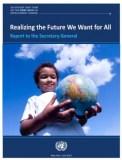In this report, the UN System Task Team lays out a vision for transformative change towards the future we want. The report was prepared to inform the open and inclusive consultations that are taking place in preparation for an ambitious development agenda beyond 2015..
Overview
Enormous progress has been made towards achieving the MDGs. Global poverty continues to decline, more children than ever are attending primary school, child deaths have dropped dramatically, access to safe drinking water has been greatly expanded, and targeted investments in fighting malaria, AIDS and tuberculosis have saved millions.
The MDGs are making a real difference in people’s lives and, with strong leadership and accountability, this progress can be expanded in most of the world’s countries by the target date of 2015.
After 2015, efforts to achieve a world of prosperity, equity, freedom, dignity and peace will continue unabated.
The UN is working with governments, civil society and other partners to build on the momentum generated by the MDGs and carry on with an ambitious post-2015 development agenda.
At the September 2010 MDG Summit, UN Member States initiated steps towards advancing the development agenda beyond 2015 and are now leading a process of open, inclusive consultations on the post-2015 agenda. Civil society organizations from all over the world have also begun to engage in the post-2015 process, while academia and other research institutions, including think tanks, are particularly active.
Secretary-General Ban Ki-moon has established a UN System Task Team to coordinate preparations for beyond 2015 and to support the work of a High-level Panel that the Secretary-General will appoint to advise him on the post-2015 agenda. President Yudoyono of Indonesia, President Johnson Sirleaf of Liberia and Prime Minister Cameron of the United Kingdom have accepted the Secertary-General's invitation to co-chair the High-level Panel.
The post-2015 agenda will reflect new development challenges and is linked to the outcome of “Rio+20” -- the UN Conference on Sustainable Development -- that took place in June 2012 in Rio de Janeiro, Brazil.
UNESCO contributed to the report. Check the UN website providing a number of resources related to the task force report.
